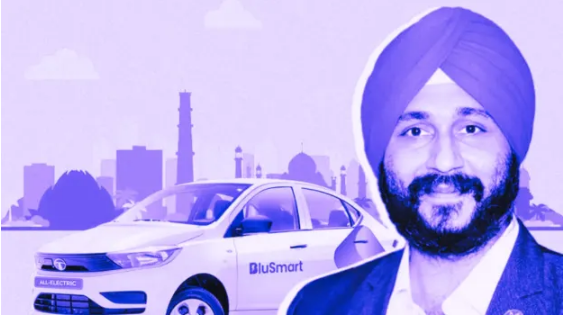While employees remain unpaid, BluSmart promoters misuse Rs 262 crore loan fund
- April 18, 2025
- Posted by: support@inintra.com
- Category: Uncategorized

SEBI alleges BluSmart and Gensol promoters Anmol and Puneet Jaggi diverted Rs 262 crore in EV loans for personal luxuries, including a Rs 43 crore Gurugram flat and a Rs 26 lakh golf set.
In what could become one of the most serious cases of financial misconduct in India’s start-up ecosystem, promoters of EV cab aggregator BluSmart and EPC firm Gensol Engineering Ltd have been found guilty of misappropriating public funds meant for electric vehicle procurement, according to an interim order issued by the Securities and Exchange Board of India (SEBI) on April 15.
The order accuses brothers Anmol and Puneet Singh Jaggi, who control both Gensol and BluSmart, of diverting Rs 262 crore—funded largely by government lending institutions—towards personal luxury purchases, high-value transfers to family members, and related-party entities. The funds were originally secured to buy 1,700 electric vehicles for BluSmart’s fleet operations.
Among the extravagant personal expenses uncovered were the purchase of a Rs 43 crore luxury apartment at The Camellias in Gurugram, located in one of India’s most exclusive residential complexes, and a Rs 26 lakh golf set from US-based TaylorMade.
These revelations, detailed in SEBI’s interim order, have sent shockwaves through India’s startup sector and raised serious questions about governance and oversight in companies backed by public money. The Jaggi brothers, now barred from accessing the securities market, have yet to issue a public response.
Employees left unpaid while money was diverted
While funds were being used to finance luxury assets, BluSmart employees reportedly experienced disruptions in salary payments. The contrast between the halted salaries and the extravagant personal expenses of the promoters has drawn strong criticism from industry observers.
SEBI’s investigation states that between 2021–2024, Gensol raised Rs 830 crore to procure 6,400 EVs, of which 80% came in the form of loans from government-backed Indian Renewable Energy Development Agency (IREDA) and Power Finance Corporation (PFC). The remaining 20% was to be contributed by Gensol as equity.
However, as of 14 February 2025, only 4,704 EVs had been procured for Rs 568 crore. The balance—Rs 262 crore—remains unaccounted for.
“Based on these figures, an amount of Rs. 262.13 crore (Rs. 829.86 crore – Rs. 567.73 crore) remains unaccounted, even though more than a year has passed since the Company availed the last tranche of the above mentioned financing,” SEBI said in its order.
Web of related-party transactions
The misappropriated funds were routed through a complex web of transactions involving related-party firms. One such route involved New Delhi-based EV supplier GoAuto, which transferred Rs 50 crore to Capbridge Ventures LLP. Capbridge then purchased the luxury flat in Gurugram’s The Camellias on behalf of the promoters’ mother.
An additional Rs 40 crore was channelled from GoAuto to Wellray Solar Industries, a related-party entity. This firm, in turn, transferred funds to four other companies, ultimately routing Rs 39 crore to the Jaggi brothers—Rs 26 crore to Anmol Jaggi and Rs 13 crore to Puneet Singh Jaggi.
SEBI noted, “Funds availed by Gensol as loans for procuring EVs were, through layered transactions, partly utilised for buying a high-end apartment in The Camellias, DLF Gurgaon, in the name of a firm where the MD of Gensol and his brother are designated partners.”
Wellray Solar Industries is largely owned (99%) by Lalit Solanki, a former Gensol employee who worked as a regulatory affairs manager until December 2018.
How the funds were spent
SEBI’s investigation revealed a series of high-value personal expenditures made by Anmol Jaggi using the Rs 26 crore received from Wellray. These included:
- Rs 26 lakh for a premium golf set from TaylorMade
- Rs 6.2 crore transferred to their mother, Jasminder Kaur
- Rs 1.86 crore to purchase foreign currency
- Rs 17.28 lakh spent at Titan Company for personal use
- Rs 11.75 lakh to DLF Homes for personal use
- Rs 3 lakh to Make My Trip for personal expenses
The funds were also invested in companies such as Ashneer Grover’s Third Unicorn Pvt Ltd (Rs 50 lakh) and Gurugram-based lithium-ion battery recycling startup BatX Energies Pvt Ltd (Rs 1.35 crore), where Anmol Jaggi became a shareholder in March 2024.
Misleading disclosures and fabricated records
SEBI also uncovered multiple instances of Gensol providing false declarations to credit rating agencies to conceal loan defaults. The company first defaulted on 31 December 2024 but continued to file “No Default Statements” with credit rating agencies.
Further, the company falsely claimed that it had received pre-orders for 30,000 units of its newly launched EVs at the Bharat Mobility Global Expo in January 2025. On investigation, SEBI found that these were non-binding Memoranda of Understanding (MoUs) signed with nine entities for 29,000 vehicles—without any pricing or delivery commitments.
“These MoUs were merely expressions of interest, lacking key contractual elements like pricing or timelines,” the order stated.
Market reaction and future of BluSmart
The fallout was immediate. On the day following the SEBI order, Gensol’s share price dropped 5% to Rs 123, hitting the lower circuit. The stock has now lost 48% of its value over the past month and is down 84% since January 2025.
With Gensol under regulatory fire, BluSmart’s future has also come under question. A report in The Economic Times suggested that BluSmart may exit its core EV cab business and pivot to becoming a fleet partner for ride-hailing giant Uber.
This potential transition further underscores the operational uncertainties plaguing BluSmart in the wake of SEBI’s damning findings.
Regulatory tightening and wider impact
SEBI’s actions against the Jaggi brothers include immediate bans from the securities market and restrictions on accessing capital. The agency has also hinted that further legal action may follow upon completion of a forensic audit.
As one of the largest financial scandals to hit India’s burgeoning EV and startup ecosystem, the Gensol-BluSmart case is expected to intensify regulatory scrutiny on startups raising public or institutional funds, particularly those claiming alignment with national priorities like clean mobility.
In the interim, questions loom large over the oversight of loan disbursements by government-backed institutions, and the due diligence practices of investors in high-growth startups.

